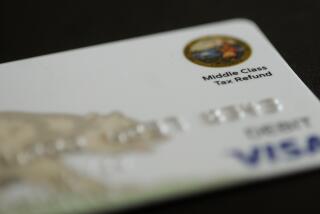FBI Stung in Medicare Sting Gone Awry
- Share via
MIAMI — FBI agents thought they were setting a trap by buying copies of 35 Medicare cards and selling them to a suspected fraud operation.
But now the cards are being used to buy expensive medical equipment--and the FBI can’t track them.
“The FBI lost control of the cards. Now they have a monster on their hands,” a government investigator familiar with the case said in a Miami Herald article Sunday.
Medicare says it can’t cancel the copied cards, which have been circulating for 16 months, because that would wipe out legitimate benefits to the people whose names are on those cards.
“Your Medicare number is the same as your Social Security number,” said Faye Baggiano, associate administrator of the Health Care Financing Administration in Washington. “And Social Security numbers are issued for life.”
Medicare routinely provides phony numbers that can be canceled once an investigation is complete. It isn’t known why the FBI insisted on using real names and authentic Medicare numbers for this investigation.
The Miami Herald said it examined the Medicare records of 10 people whose numbers were sold.
Twenty-three clinics and companies billed Medicare a total of $163,745 for services that the real cardholders say they never received nor tried to receive.
One of the 10, Esther Machado, said Medicare paid a claim in her name for $3,205 for leg braces. Nothing is wrong with her legs.
Maria and Rogelio Rodriguez have lungs that work fine, but someone using fake cards with their names and Medicare numbers was paid $5,484 for his-and-her oxygen equipment.
“How can they let this happen to people they are supposed to protect?” asked Maria Gutierrez, 76, whose card was used for a $2,555 claim for a six-month supply of feeding tubes and liquid formula.
The FBI and Medicare are still investigating, but there have been no arrests.
More to Read
Sign up for Essential California
The most important California stories and recommendations in your inbox every morning.
You may occasionally receive promotional content from the Los Angeles Times.










